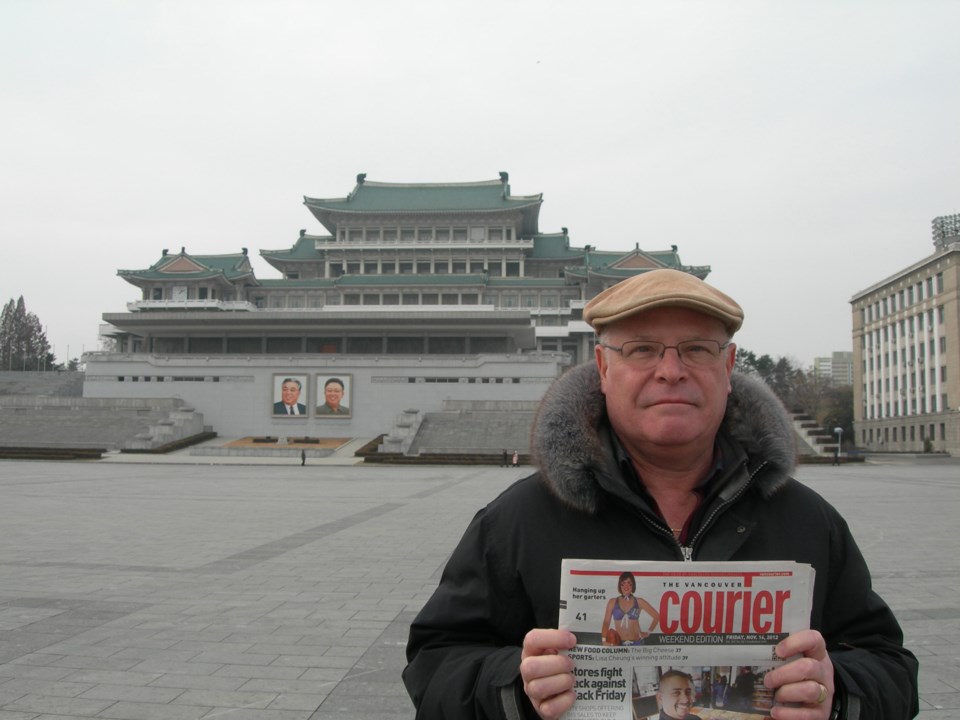Western media outlets are rarely granted unfettered access to the Democratic People’s Republic of Korea. The Courier managed to visit the secretive regime, although the newspaper wasn’t there to cover any major news stories regarding North Korea’s ballistic missile testing program, supreme leader Kim Jong-Un’s recent execution of an ex-girlfriend by firing squad or even the unlikely state visit by colourful former NBA star Dennis Rodman.
Instead, an Oakridge resident who works with the United Nations World Food Programme (WFP) brought a copy of the paper along to pose with for our Exotic Courier section on a visit last year.
Chris Czerwinski, 58, spent several years helping to organize emergency food distribution to the remote north Asian country during a famine in the mid-’90s, but his visit last December marked the first time he’d actually stepped foot inside the so-called Hermit Kingdom. He said he was nonetheless given quite a bit of freedom to explore the country unaccompanied by government officials due to his humanitarian history.
“If you were to go as a normal Canadian, you would have a minder with you from the moment you leave the hotel,” said Czerwinski, “but I had a very enjoyable experience because the new deputy country director for the WFP was also new to the country, and every weekend we could travel quite freely around the country and visit all the monuments.”
Czerwinski brought his copy of the Courier to a number of North Korea’s main attractions, such as the massive Kim Il-sung Square in Pyongyang, the 170-metre Juche Tower, a monument built to symbolize the national philosophy of self-reliance, and the tomb of Mao Anying, Chairman Mao’s son who was killed in action during the Korean War.
Although he didn’t get his photo taken with any of them, he also witnessed a few of Pyongyang’s famously robotic traffic cops in action.
“The traffic police are all women and they are all very tall and very beautiful and they have these blue uniforms and black high heel boots,” he explained. “Just go on the Internet and Google them and you will see all these videos that people have taken. It’s kind of a quirky fetish thing and there seems to be a very large following.”
Czerwinski’s career as an agronomist has brought him to a wide variety of different countries since graduating from UBC in 1979, including Egypt, Chechnya, Mali, China, Sudan and Madagascar, where he met his wife Rachelle. North Korea was truly unlike anywhere else he’d ever been.
“It’s like the people are all uniform,” he said. “I mean, they are polite and the ones who speak English seem nice but people don’t seem to have any individuality.”
He added that he also found it hard to tell if their legendary nationalistic fervour is genuine or expressed out of fear of their totalitarian government.
His visit coincided with the country’s launch of its first satellite into orbit, an act most countries condemned as a threat to global security because the technology is the same as that used with intercontinental ballistic missiles. Czerwinski, whose Vancouver home falls within potential missile range, watched the event unfold from a restaurant inside a diplomatic compound where the staff all spoke English.
“The waitresses were all standing in front of this big flatscreen TV that was showing this missile being fired off,” he said. “One of the more vocal ones said to us: ‘Aren’t you going to congratulate us?’ and we were like ‘what!’ It is so hard to tell if the devotion is real or feigned.”
Czerwinski’s trip wasn’t simply for pleasure, however, as he was also there on WFP business. Whatever their social problems, he said mass starvation is no longer a major concern for North Koreans.
“The project I helped to develop last December really only concerns pregnant or lactating women or children, not like it was back then when it was blanket, when we were feeding most of the country.”
afleming@vancourier.com



